Impact of COVID-19 on Graduate Education Access: Selected Results from the 2020 NAGAP/CGS Survey of Graduate Enrollment Professionals
Download the Complete Research Brief
Learn MoreSince the onset of the COVID-19 pandemic, concerns on graduate education access and success have not gone unnoticed (Flaherty, 2020a, 2020b). To examine how prospective students and enrollment management professionals may be responding to the pandemic, the Council of Graduate Schools (CGS), in partnership with NAGAP, The Association for Graduate Enrollment Management, fielded the 2020 NAGAP/CGS Survey of Graduate Enrollment Management Professionals. The survey, which was sent to active NAGAP members in November and December 2020, asked a series of questions, including U.S. graduate enrollment trends in Fall 2020, outreach efforts, and graduate school pipeline issues, among other topics. A total of 217 GEM professionals working across the graduate schools, university office of admissions, professional schools, academic colleges, and academic programs responded to the survey. Approximately 60% of them identified themselves as lead GEM professionals on their campuses. (Figure 1)

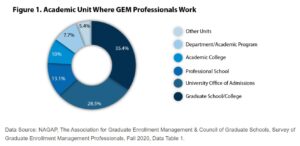
Data Source: NAGAP, The Association for Graduate Enrollment Management & Council of Graduate Schools, Survey of Graduate Enrollment Management Professionals, Fall 2020, Data Table 1.
Key Findings
- Campus Climate & Work-life Balance. Approximately 66.3% of survey respondents agreed that students of color have shown greater concern about campus culture and climate than their majority counterparts. About 63.2% of respondents reported that work-life balance was a very important concern for students overall, with the percentage being somewhat higher for female students (66.7%) and students of color (64.9%). (Figure 2)

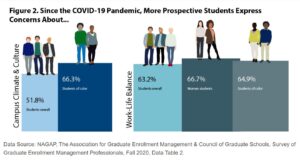
Data Source: NAGAP, The Association for Graduate Enrollment Management & Council of Graduate Schools, Survey of Graduate Enrollment Management Professionals, Fall 2020, Data Table 2.
- Exacerbated Affordability Concerns. Overwhelmingly, 82.2% of respondents agreed that more prospective domestic students had expressed concerns about the affordability of graduate and professional education since the COVID-19 pandemic. The majority (61.1%) noted that more prospective domestic students have chosen to defer their graduate or professional education since the onset of the pandemic.
- Questions About the Value of Graduate Education. Few respondents agreed that prospective students have been losing interest in graduate school. However, the number of respondents who agreed that more prospective domestic students are questioning the value of graduate education outnumbered those who disagreed.
- More Funding, More Career Development Support. Overwhelmingly, 95.9% of respondents cited the importance of the availability of additional funding opportunities to reduce student loan debt as a way to maintain the interest and motivation of prospective domestic students of color to pursue a graduate degree. Additionally, more information on career opportunities (83.0%) and opportunities to connect current students with alumni for informational interviews (68.3%) received high ratings. (Figure 3)
.png)
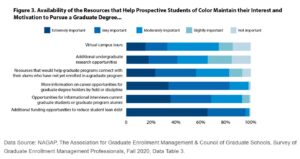
Data Source: NAGAP, The Association for Graduate Enrollment Management & Council of Graduate Schools, Survey of Graduate Enrollment Management Professionals, Fall 2020, Data Table 3.
- Use of National Outreach Resources. Ronald E. McNair Postbaccalaureate Achievement Program was the most highly used (36%) program for student recruitment according to the survey respondents. However, over half of the respondents did not engage with any programs to promote graduate education among prospective students of color. (Figure 4)

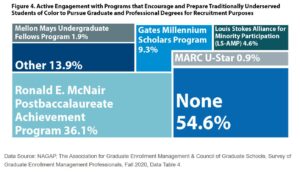
Data Source: NAGAP, The Association for Graduate Enrollment Management & Council of Graduate Schools, Survey of Graduate Enrollment Management Professionals, Fall 2020, Data Table 4.
- Program Suspension for Fall 2021. With regard to the plan for the Fall 2021 admission cycle, respondents at large did not report any suspension in admission across all the broad fields. However, it should be noted that 6.5% reported that they would be suspending admission to some master’s or research doctorate programs in arts & humanities fields. The suspension plan was also noted in social & behavioral sciences fields. (Figure 5)

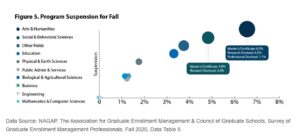
Data Source: NAGAP, The Association for Graduate Enrollment Management & Council of Graduate Schools, Survey of Graduate Enrollment Management Professionals, Fall 2020, Data Table 5.
Key Takeaways
- Consistent with the pre-pandemic time, affordability of graduate education continues to be a concern among both prospective graduate students and graduate schools. The availability of financial incentives to maintain students’ interest is considered one of the most compelling drivers of graduate enrollment.
- There appears to be a growing question about the value proposition of graduate education. Making the connection between graduate programs and potential career outcomes is more important than ever. National efforts such as the CGS Understanding PhD Career Pathways for Program Improvement Project, AHA Career Diversity for Historians Initiative, and the Coalition for Next Generation Life Science support graduate institutions and programs to better communicate the career opportunities and outcomes of their graduates.
- The survey data suggest that programs designed to encourage and prepare traditionally underserved students to pursue graduate and professional degrees were utilized by less than half of GEM professionals. Efforts such as National Name Exchange and McNair Scholars List are available platforms and resources for graduate institutions and programs to identify a pool of qualified underrepresented graduate students to successfully recruit, develop and retain.
- Consistent with other reports (Flaherty, 2020b; Zahneis, 2020), there has been a temporary moratorium on academic programs, particularly in some of the arts & humanities and social & behavioral sciences fields. Admission suspensions, as well as enrollment size reductions, will likely have a longer-term impact (Zahneis, 2021).
- Beyond the data points shared in this brief, the graduate education community also faces a larger volume of deferred admissions of international graduate students (Zhou & Gao, 2021), which may interfere with the continuing cohort and new enrollment in the 2021 admissions cycle and beyond. This is another challenge graduate schools and programs, and GEM professionals, likely face in the coming months.
Conversation Starters
- In response to COVID-19, what efforts do your institution and graduate programs take to maximize funding and career resources that increase access for prospective graduate students while ensuring success for current graduate students?
- How are your institution and graduate programs re-envisioning and revising plans, strategies, and efforts that enforce diverse and inclusive virtual learning environments for minority students and accommodate female students with other needs or demands?
- How do you evaluate the effectiveness of these approaches and resources in motivating and engaging prospective graduate students?
- How do your institution and graduate programs plan to provide continuous support to retain and reboot graduate enrollment in a post-pandemic future?
References
Flaherty, C. (2020a, April 7). What About Graduate Students? Inside Higher Ed. Retrieved from https://www.insidehighered.com/news/2020/04/07/graduate-students-seek-time-degree-and-funding-extensions-during-covid-19
Flaherty, C. (2020b, June 1). Pausing Grad Admissions. Inside Higher Ed. Retrieved from https://www.insidehighered.com/news/2020/06/01/some-departments-plan-suspending-or-limiting-graduate-cohorts-year-or-longer-free
Zahneis, M. (2020, September 28). More Doctoral Programs Suspend Admissions. That Could Have Lasting Effects on Graduate Education. The Chronicle of Higher Education. Retrieved from https://www.chronicle.com/article/more-doctoral-programs-suspend-admissions-that-could-have-lasting-effects-on-graduate-education
Zahneis, M. (2021, February 15). The Shrinking of the Scholarly Ranks. The Chronicle of Higher Education. Retrieved from https://www.chronicle.com/article/the-shrinking-of-the-scholarly-ranks
Zhou, E., & Gao, J. (2021). International Graduate Applications & Enrollment: Fall 2020. Council of Graduate Schools.
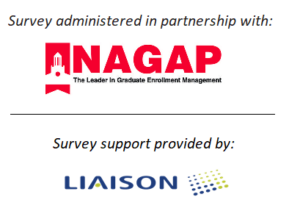

The brief was prepared by Janet Gao, under the direction of Hironao Okahana. J.G. conducted data collection and preparation, analysis of the data, and prepared an initial draft. H.O. directed the underlying research activities for the 2020 NAGAP/CGS Survey of Graduate Enrollment Management and supervised the analysis for this work. The survey was administered in partnership with NAGAP, The Association for Graduate Enrollment Management, with support from Liaison International.
Special thanks to Suzanne T. Ortega and NAGAP Leadership Team for feedback on earlier drafts. Many thanks to Harper Garfinkle for her contribution in data visualization, Matthew Linton for preparation of the final product, and with Liaison International for their financial support for this survey.
